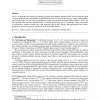Free Online Productivity Tools
i2Speak
i2Symbol
i2OCR
iTex2Img
iWeb2Print
iWeb2Shot
i2Type
iPdf2Split
iPdf2Merge
i2Bopomofo
i2Arabic
i2Style
i2Image
i2PDF
iLatex2Rtf
Sci2ools
113
click to vote
APPROX
2008
Springer
2008
Springer
Learning Random Monotone DNF
We give an algorithm that with high probability properly learns random monotone DNF with t(n) terms of length log t(n) under the uniform distribution on the Boolean cube {0, 1}n . For any function t(n) poly(n) the algorithm runs in time poly(n, 1/ ) and with high probability outputs an -accurate monotone DNF hypothesis. This is the first algorithm that can learn monotone DNF of arbitrary polynomial size in a reasonable average-case model of learning from random examples only. Our approach relies on the discovery and application of new Fourier properties of monotone functions which may be of independent interest.
Related Content
| Added | 12 Oct 2010 |
| Updated | 12 Oct 2010 |
| Type | Conference |
| Year | 2008 |
| Where | APPROX |
| Authors | Jeffrey C. Jackson, Homin K. Lee, Rocco A. Servedio, Andrew Wan |
Comments (0)

